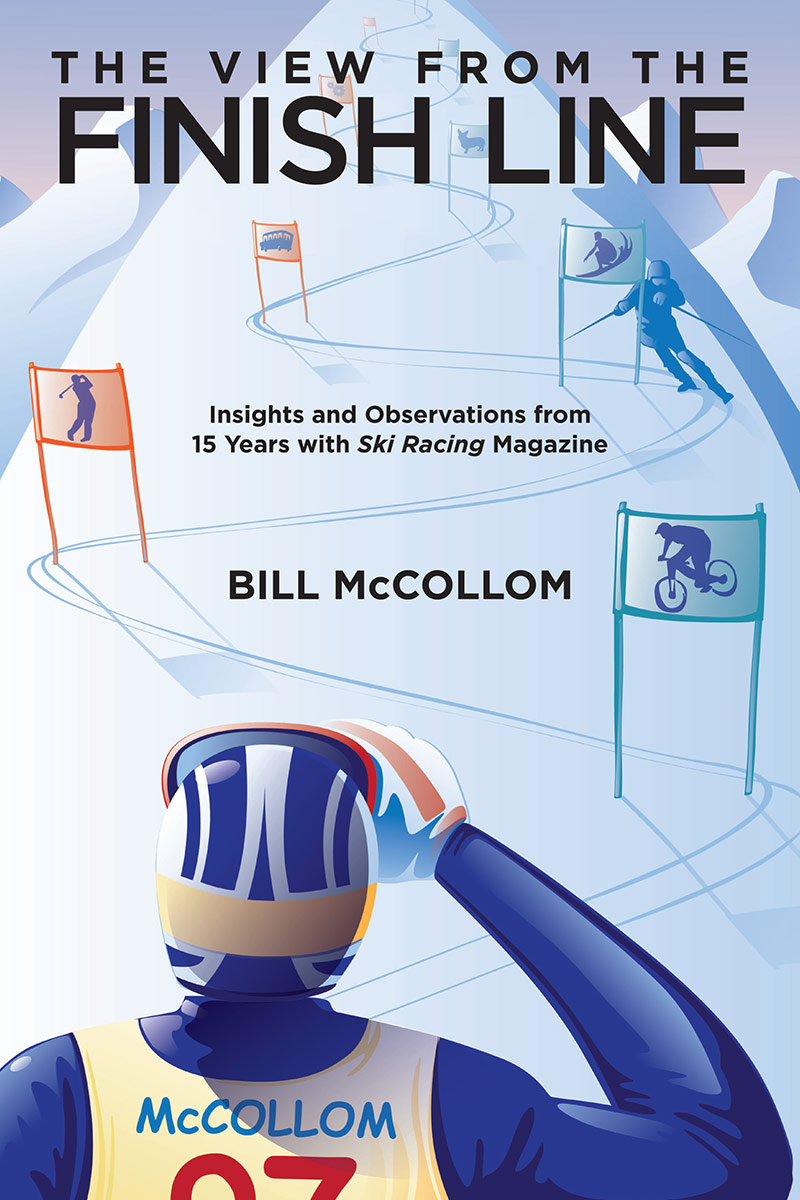A Christmas Carol
How one aging athlete found the true meaning of ski racing
The Vermont house is cold and dark, and a gusting December wind whips snow against the outside walls and windows. Bill has tuned his skis in anticipation of the first race of the season the next day, and he’s now wrapped in a fleece blanket as he settles into his usual chair in front of the TV. The gas fireplace is set on the lowest level, and a 45-watt light bulb barely illuminates the race results that consume Bill’s attention. “A Christmas Carol” with George C. Scott flickers on TV, and Otis, the family cat, has assumed his usual perch on top of Bill’s head.
Bill revels in his miserliness. Of particular relief is the disastrous economic news. “At least I now have a good excuse to never go shopping again,” Bill says to Otis, who kneads Bill’s head with his claws as he purrs. Bill turns his attention back to the old set of last year’s race results. “Can you believe how badly Fred and Hans beat me last year?” Bill asks Otis, who emits a string of drool into Bill’s thinning gray hair. “I must have missed the wax, but there will be retribution tomorrow, by gosh.”
Suddenly, the gas fireplace hisses to life and a burst of flame fills the screen. Otis quickly scurries under the couch, but Bill notices a strange sight taking shape. The flames are forming the face of Al Sise, the beloved father of masters ski racing who passed away some 15 years earlier. Bill inhales sharply, but finds the courage to ask, “Al, what are you doing here?”
Al replies in a dreadful monotone: “You have lost your way. And because of this, you will be visited by three spirits this evening. Listen to them very closely.” After a sudden explosion, the fire disappears, leaving only the stench of propane gas. Bill quickly turns off the thermostat, and says, “Humbug! I must have a touch of indigestion.”
Bill dons his full-length underwear and climbs into bed. Otis is already asleep on the adjacent pillow. They are awakened from their slumber by a blast of icy wind that nearly blows the covers off the bed. Bill looks up to see a beautiful woman at the foot of the bed dressed in skin-tight stretch pants and a form-fitting reindeer sweater. He slowly recognizes that it’s Betty Bertram, his first coach back at Suicide Six ski area.
Before he can say anything, Betty pulls off the remaining bed covers and beckons that Bill should follow her. “I want you to see something,” coos Betty. Bill gladly takes her hand as a snow squall envelops the room.
When the snow subsides, Bill and Betty are standing at the foot of Suicide Six. The old Poma lift is taking young racers up the hill. “Look at that young racer coming down,” says Betty. “That’s you when you were 8 years old.”
Bill stares in awe at the youngster speeding through the gates, who then flops in the snow, laughing after his run. His friends, who are busy throwing snowballs, quickly drag Bill back on his feet. One of them says, “Let’s go down Laskey Lot and jump off God’s Knoll.” They soon disappear in peals of laughter.
Betty looks over at Bill and says: “Did you notice, they never went over to the scoreboard to check their times? I’ll bet they’re off to go ski in the woods and…” Her comment is cut short when a pile of snow from an overhanging branch falls on her and she disappears, leaving Bill standing at the side of his bed.
“Humbug, it’s all a load of hooey,” says Bill as he climbs back into bed.
Sometime later that night Bill sits bolt upright after hearing footsteps on the stairs. Suddenly at the foot of his bed is Bobo Sheehan, his old college coach. “Bobo, what’s going on?” Bill exclaims in wonder.
“Leave the worries to me, Billy. Let’s go,” Bobo replies with a big grin. As soon as Bill touches Bobo’s well-worn Middlebury College Ski Team parka, they fly through the wall. Spinning and flailing, they finally touch down at the scoreboard in the fading daylight of tomorrow’s masters race.
“See that guy standing at the scoreboard staring at the times all by himself?” Bob asks Bill. “Well, that’s you. And do you know why you’re all alone?” His voice is rising. “Because you straddled a gate up there and didn’t tell anyone, and then you called Hans and Fred losers because you beat them.”
Bill quickly mounts his defense. “But Bobo, I’ll get the jump on these guys in the standings, and besides, hooking a tip isn’t that big a deal. It didn’t make my time any faster. And furthermore, I’m sick of talking about it. I have to go to the awards ceremony to get my trophy. With that, Bill grabs a nearby snow gun and aims it in Bobo’s direction. Poof – Bobo disappears and Bill is somehow back at home on the bed with Otis.
“Humbug, Otis, I say,” Bill exclaims. “But it’s good to know that I’ll win tomorrow.
Bill is suddenly jolted awake when Otis sinks his claws into his chest. A hooded figure is standing silently at the foot of the bed. A bony finger, protruding from his sleeves, is pointed at Bill.
Without warning, the spirit grabs Bill by the throat, and they are sliding down a snow-covered slope until they both come crashing into the ski club building at the base of Suicide Six, which is hosting a masters race. The silent specter points to the timing room. Bill recoils in horror at the sight of himself, 20 years into the future. His grizzled, gray and grumpy future self is yelling at the young lady, who is trying to focus on keeping the race going.
“There’s no way I could be four seconds behind Hans and Fred. Hans is on crutches and Fred has the gout. Check my time again,” the older Bill screams at the frazzled young volunteer. As Bill is jumping up and down, he suddenly spins around three times, grasps his chest, and falls into a heap among the timing machines.
Unfazed, the young timer grabs Bill by his Lange boots and yanks him off the desk. She takes a moment to straighten the timers, and then radios up to the start. “We’re ready for the next racer.”
“But spirit, surely it cannot end this way,” blubbers Bill. “I’ll promise to change my ways. I’ll no longer be consumed with the results, times and whether or not I beat Hans and Fred. I’ll keep the spirit of ski racing first and foremost in my heart and soul. I’ll appreciate everyday I’m healthy enough to enjoy this beautiful sport. Please, oh please, spirit, let this not be my end.” Bill grabs onto the spirit’s cloak sobbing, but when he opens his eyes, he discovers he’s yanking on Otis’s tail.
A wave of relief washes over Bill, as he rushes to the basement and sees that his skis are still there. That day at the races, Bill never even approaches the scoreboard for fear that it will diminish his appreciation of the blue skies and snow-covered trees. In fact, his heart is so overwhelmed with the true spirit of ski racing that at the awards ceremony that evening, he stands on a chair and proclaims to the startled audience, “God bless us, every one.”
Masters racers are still trying to make sense out of this outburst.
Note: This piece originally ran in 2009 and is reprinted with permission from Bill McCollom. Read this and many more original takes on the sport in “The View from the Finish Line,” a 222-page paperback collection of McCollom’s contributions to Ski Racing, now available for $20 from Enfield Publishing enfielddistribution.net.






















